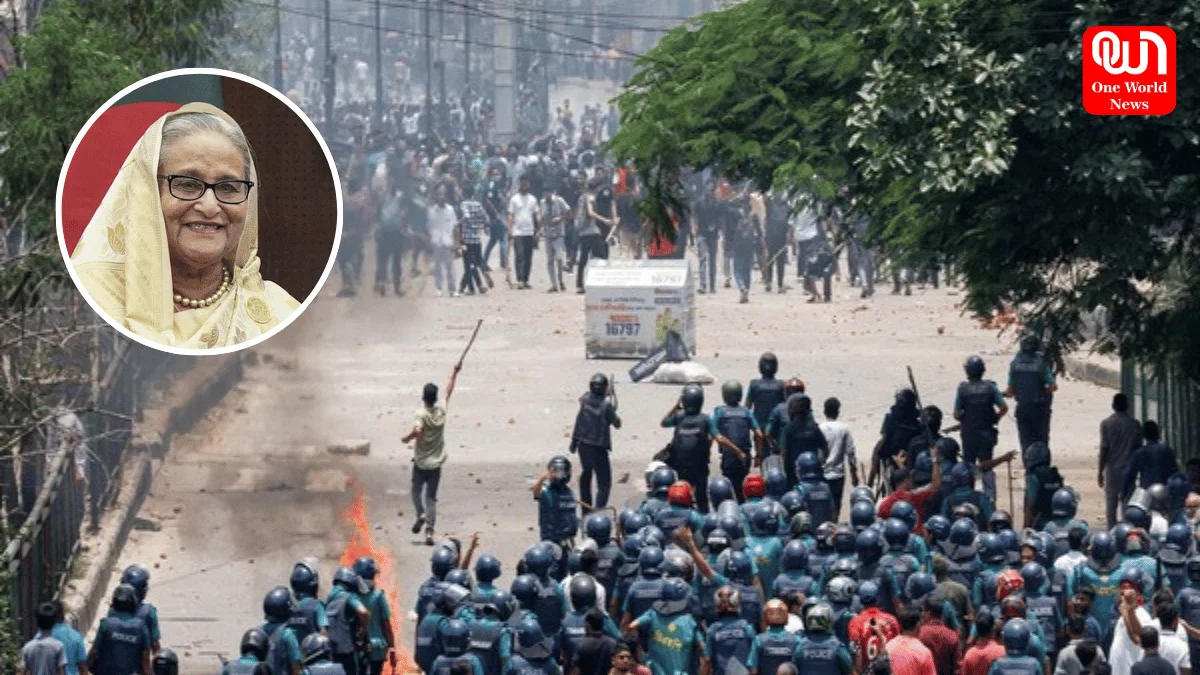Bangladesh Political Crisis: Sheikh Hasina’s Ouster Triggers Geopolitical Tensions; Pakistan’s ISI and China Under Scrutiny, Impacting South Asia’s Power Dynamics
The ouster of Bangladesh's Sheikh Hasina has sparked geopolitical tensions, with Pakistan’s ISI and China under scrutiny, altering South Asia's power balance.
Bangladesh Political Crisis: Sheikh Hasina’s Ouster Sparks Geopolitical Tensions with Pakistan’s ISI and China Under Scrutiny, Altering South Asia’s Power Balance
The political change in Bangladesh may have major effects on the geopolitical landscape of the region and the world. This strategically located country has become an important prize for those big powers famed for their splendid foreign policies namely China, the USA and Pakistan who all have their different intentions and goals at heart. According to the analyst, this means that a change to a new balance of forces in Bangladesh has emerged with the possibility that a new foreign policy could be constructed, which might redraw the strategic map of South Asia. India, for instance, has long-standing issues that are magnified by the recent shifts in the global landscape. The close ties that Modi’s government has with Hasina’s administration on behalf of Bangladesh means that any change in the leadership of Dhaka could therefore be pretty transformative of India’s internal politics and international politics as well. These areas of interest are likely to be: International relations, regional security, trade links and relations, and relations between nations.

Read more: Political Turmoil In Dhaka- BSF Stops Local Movement Near India-Bangladesh International Border
The Bangladeshi political map has shifted significantly after the Abdullah Tarique Sheikh leading Bangladeshi Prime Minister Sheikh Hasina resigns on August 5, 2024 due to increasing demonstrations. Unstable political transition has not only created power struggle but has also incited intricate political games in South Asia and involves actors like China, the United State, and Pakistan. Each nation is now trying to shape the future leadership of Bangladesh and its sphere of alliances, which puts the country in focus in the existing geopolitics. Political crisis continues to unfold as demands for a new interim government are made, and Muhammad Yunus, Nobel Peace Prize winner, may assume the leadership amid the turmoil.
Read more: Delhi Police Chargesheet Reveals Arvind Kejriwal’s Presence After Swati Maliwal Assault
Demise of Sheikh Hasina’s 15-year Rule The abrupt end to power after 15 years as the prime minister of Bangladesh on the 5th of August 2024 completely changes the political landscape in the region subsequently. This shift is attributed to in-house factors, external forces, and unrelenting economic factors as outlined below. The event that eventually led to Hasina’s fall from power was a disputed job quota policy that they opposed fiercely. It started as a students’ protest against the adoption of a pro-1971 liberation war descendants quota system and developed into a civil disobedience campaign across the country. This policy led to a brutal clamp down by the government that saw over 300 people killed, and this where the protest escalated. The frustration against Hasina’s more increasingly autocratic administration had been coming through the rear of power and authority to suppress the rising discord. The most dramatic event was when the instructed and usually loyal military forces did not want to establish a curfew involving the use of force. This has forced Hasina to vacate from the country and take a military helicopter to escape out of Bangladesh.
External pressure: It is important to emphasize that the domestic opposition was not the only one growing increasingly critical of Hasina’s government; increasingly, the international actors also started voicing their concern. The United States particularly acted as an eagle eye and critiqued what it considered as democratic regression in Bangladesh. The US Treasury announced the Magnitsky sanctions in December 2021 on six top officials of the RAB Bangladeshi security force due to human rights violations. This was followed by a visa policy in May 2023 on Election democracy to encourage the conduct of free and fair elections in the country. The international community reaction followed by the recent organized general elections that took place on 7th January 2024 further weakened the Hasina government’s legitimacy. There are criticism and reports of the emergence of voting irregularities and pre-election violence prior to the organization of polls more notably the United States and the United Kingdom criticized the polls.
Economic Challenges: Although Bangladesh had remained one of the most successful economic growth stories in the recent past under Hasina’s leadership, this situation has been reversing in the recent past. During mid-2022 up to the present time, the country has encountered a number of immense economic problems, especially due to the government’s inefficiency in addressing external factors. The attempts to regulate inflation have recently been unsuccessful through artificial control of foreign exchange through pegging of the currency has resulted into multiple exchange rates that have discouraged both importation of foreign currencies as well as exerting pressure on foreign reserves. Prices have steadily risen, and according to official statistics, inflation is currently at about 10 percent, which is rather high as compared to the rates in nearby countries. These economic woes have contributed to growing social unrest. In late 2023, tens of thousands of garment workers took to the streets demanding wage increases, highlighting the widening gap between economic growth and wealth distribution.
We’re now on WhatsApp. Click to join
Geopolitical Maneuvering: The power vacuum left by Hasina’s ouster has sparked intense geopolitical maneuvering. China, the USA, and Pakistan are all vying for influence, each with its own strategic interests. China has been increasing its economic and infrastructural investments in Bangladesh, while the USA is promoting democratic processes and countering China’s influence. Pakistan, meanwhile, is believed to be supporting Islamist parties and anti-India narratives to reassert its influence. This geopolitical contest underscores Bangladesh’s strategic importance and the high stakes involved for regional and global powers.
Like this post?
Register at One World News to never miss out on videos, celeb interviews, and best reads.








